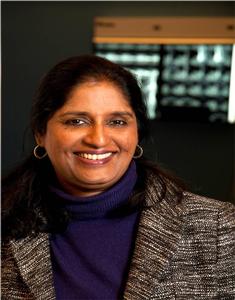Weight Gain Risk Higher Among Breast Cancer Survivors
Breast cancer survivors are more likely to experience weight gain than cancer-free women of the same age and menopausal status, according to a recent study published in Cancer Epidemiology, Biomarkers & Prevention.
Kala Visvanathan, MD, MHS

Kala Visvanathan, MD, MHS
Breast cancer survivors are more likely to experience weight gain than cancer-free women of the same age and menopausal status, according to a recent study published in Cancer Epidemiology, Biomarkers & Prevention.
The study looked at 303 breast cancer survivors and 307 age- and menopausal status—matched, cancer-free women from the ongoing Breast and Ovarian Surveillance Service cohort study, which is comprised of women with familial risk for breast and ovarian cancer, including BRCA1/2 mutation carriers. Women were recruited to the study from the cancer genetics clinic at the Johns Hopkins Sidney Kimmel Comprehensive Cancer Center from 2005-2013. .
Participants completed a baseline questionnaire covering such aspects as weight, height, physical activity and lifestyle, as well as their cancer history, treatments and medication use, with at least one follow-up questionnaire administered every 3 or 4 years.
Of the 303 breast cancer survivors included in the study, 179 had received treatment within 5 years before baseline and 123 had received treatment more than 5 years before baseline. About 50% reported receiving chemotherapy, and about two-thirds reported receiving hormonal therapy. Sixty-eight percent of the breast cancer survivors and 72% of the cancer-free women had reported baseline physical activity that met American Heart Association recommendations. .
Researchers found that survivors who were diagnosed with breast cancer within 5 years before the baseline questionnaire was completed gained an average of 3.81 pounds more than cancer-free women. No significant weight gain was seen among those diagnosed with breast cancer more than 5 years before baseline. .
Weight gain—risk was also particularly significant among survivors diagnosed with estrogen receptor (ER)-negative tumors within 5 years before baseline, with the average survivor in this population gaining 7.26 pounds more than cancer-free women. .
Survivors who had received chemotherapy (with or without hormone therapy) within 5 years before baseline were also at higher risk, and were found to be more than twice as likely to have gained at least 11 pounds compared with cancer-free women. Weight gain was even more common amongst survivors who took statins while undergoing chemotherapy treatment. .
These findings are concerning, said Amy Gross, MHS, the first author on the study and a doctoral candidate in the department of epidemiology at the Johns Hopkins Bloomberg School of Public Health. .
“Weight gain of this magnitude in adults has been associated with increased future risk for chronic diseases like coronary heart disease, hypertension, and type 2 diabetes,” said Gross in a statement. “We are continuing to follow our study participants to track weight-gain patterns over a longer period of time.” .
Healthcare professionals need to be aware of the increased risk of weight gain among survivors, and pay closer attention to fluctuations in weight during and after cancer treatment. .
“Longer follow-up is needed to confirm the persistence of weight gain in breast cancer survivors and understand the metabolic changes that may be occurring,” said study author Kala Visvanathan, MD, MHS, in a statement. Visvanathan is associate professor of epidemiology at the Johns Hopkins Bloomberg School of Public Health and director of the Clinical Cancer Genetics and Prevention Service at the Sidney Kimmel Comprehensive Cancer Center.
Gross Al, May BJ, Axilbund JE, et al. Weight change in breast cancer survivors compared to cancer-free women: a prospective study in women at familial risk of breast cancer [published online ahead of print July 15, 2015]. Cancer Epidemiol Biomarkers Prev.
Nurse Practitioners Weigh in on Data From the San Antonio Breast Cancer Symposium
January 16th 2023Loyda Braithwaite, MSN, RN, AGPCNP-BC, AOCNP; and Jamie Carroll, APRN, CNP, MSN, highlight presentations from the 2022 San Antonio Breast Cancer Symposium that will influence oncology nursing practice.


